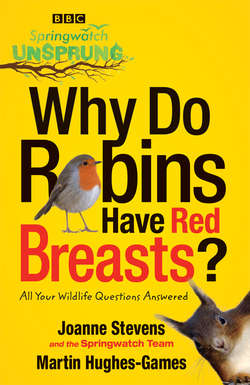Читать книгу Springwatch Unsprung: Why Do Robins Have Red Breasts? - Jo Stevens - Страница 16
The Sweet Smell of Success
ОглавлениеDo starlings like scented nests? Earlier this spring I saw a couple of starlings pulling bits out of my lavender bush and flying off with them, at about the time that they were nesting. I can only assume they like the smell. By the way, I now have approximately 50 starlings – adults and young – feeding in my small town garden. Sue
Male starlings have been known to adorn their nest with yarrow, parsley and hawthorn as well as lavender. They might be attempting to court a female by saying it with flowers but it seems that scent is more important than beauty. Several species of birds appear to have a penchant for aromatherapy, not just starlings, and they continue to bring scented plants to the nest once their chicks have hatched.
On Springwatch, cameras inside a blue tit nest showed the adults bringing in mint – they didn’t feed it to the chicks but placed it around the nest. At first, biologists thought birds might be using aromatic plants to deter parasites such as lice, maggots and ticks, much like we use mothballs. In fact, French biologists have discovered that plants such as mint, lavender and the curry plant are used for their antibacterial properties. Blue tit chicks raised in nests lined with these aromatic plants have fewer bacteria on their skin. This may allow them to put effort into their growth rather than strengthening their immune system. Chicks surrounded by scented leaves appear to grow more quickly and thus have a better chance of survival. Individual blue tits have particular preferences for which plant they collect – some prefer mint while others always collect lavender, even when both herbs are available.
A similar study on starlings showed that the air inside nests lined with fresh herbs is full of volatile compounds – smelly chemicals from the plants’ essential oils. They include limonene (citrus-like), myrcene (from thyme) and phellandrene (peppery-minty, like eucalyptus). The aromatic plants were shown to repel mosquitoes as well as inhibit the growth of bacteria; this is advantageous because blood-sucking insects aren’t just an annoyance, they can spread diseases to the chicks.
City birds have adapted to their surroundings by using cigarette butts instead of plants to scent their nests. Research in Mexico showed that by lining their nests with the nicotine-infused filters from smoked cigarettes, house sparrows and finches reduced the number of mites and other parasites. Nicotine is a natural insect repellent produced by the tobacco plant as a defence against herbivores, so it’s not a surprise that it deters parasites too. Over the years, Springwatch has received many photos of blue tits and other birds nesting in cigarette butt bins, so it seems that British birds have learned the same trick.
